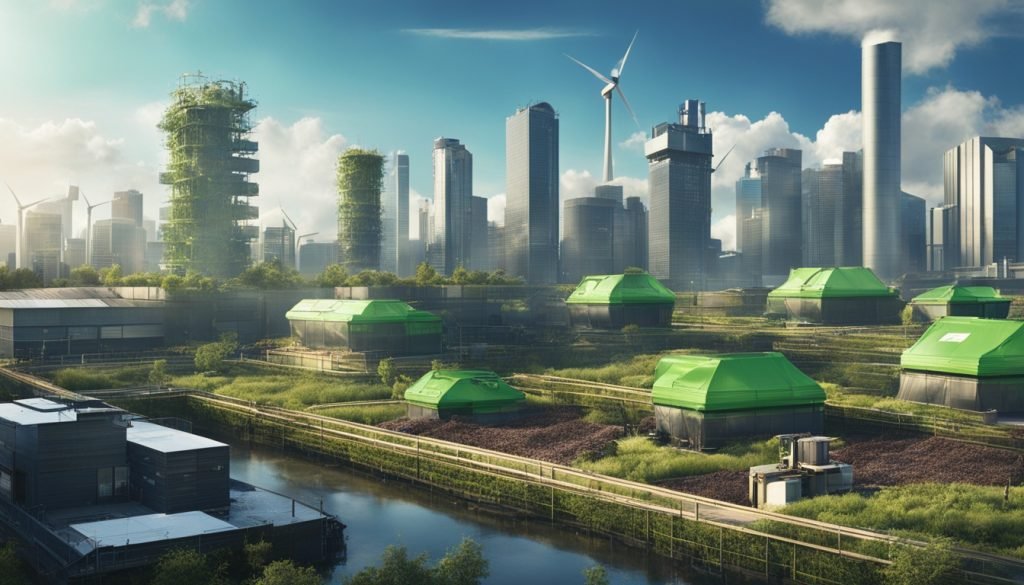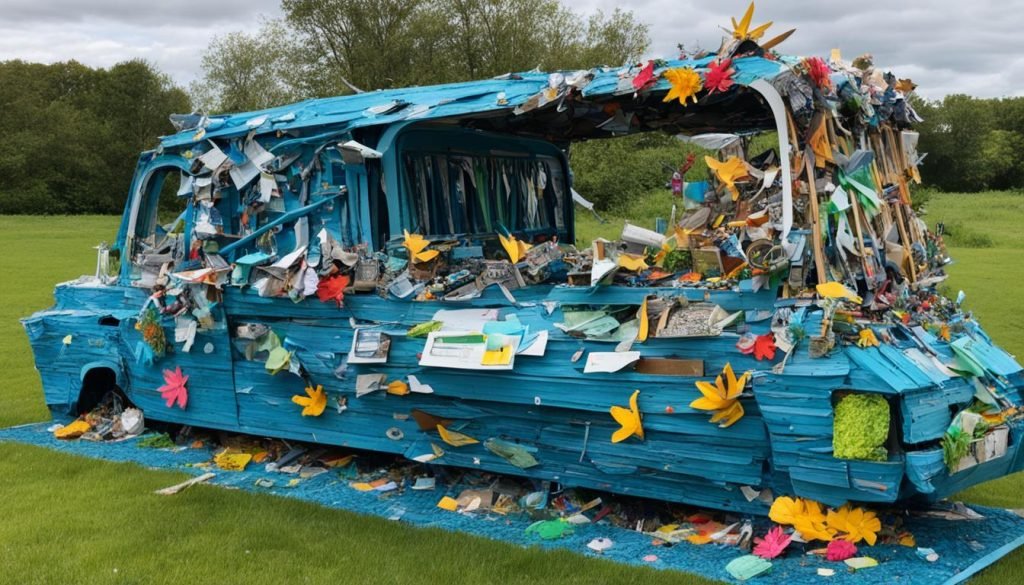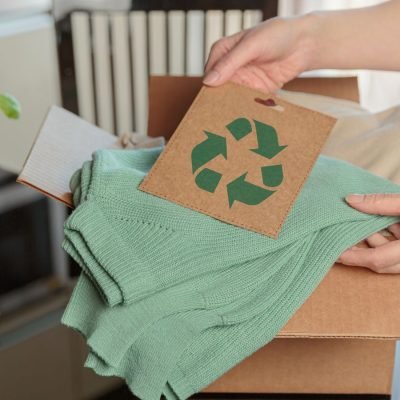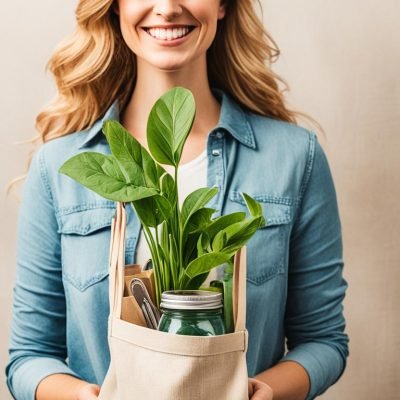Do you know that the average American makes about 4.9 pounds of waste daily? This big amount of waste shows we need to reduce waste fast. By using zero waste living ideas, we can help the earth a lot. Everyone can do their part to help make a greener future.
Zero waste living means we focus on making less waste and using resources wisely. It’s about choosing to waste less and save more every day. You can help by reusing things, recycling, composting, and finding new uses for old items.
Zero waste living touches many parts of our lives, from what we buy to our habits. Simple acts like using your own bags, bottles, and cups can cut down on plastic waste. This reduces pollution in our oceans and landfills.
Composting leftovers helps keep waste out of dump sites. It also improves soil and cuts down on using chemicals. Living with less stuff and finding new uses for old things lowers the need for making more items. This helps cut down on waste.
Choosing a zero waste lifestyle is good for the planet and our happiness. It helps us keep things simple, decreases mess, and lets us focus on what’s important.
Key Takeaways:
- Zero waste living ideas can help minimize waste and promote a greener future.
- Using reusable products and composting food scraps are simple but effective ways to reduce waste.
- Embracing a minimalist lifestyle and upcycling old items can further contribute to waste reduction.
- Zero waste living is not only beneficial for the environment but also for our personal well-being.
- By adopting sustainable practices, we can create a better future for generations to come.
Easy Ways to Reduce Your Waste
Reducing waste is vital for a sustainable lifestyle. Simple changes in our daily lives can cut down our effect on the environment. There are easy and practical methods to reduce waste.
- Use reusable cloth produce bags: Choose reusable cloth bags for groceries. They’re durable, washable, and can be used many times.
- Avoid single-use plastics: Single-use plastics like bottles and straws harm the planet. Use alternatives such as stainless steel water bottles and metal straws.
- Compost your food scraps: Don’t throw food scraps away; compost them. This method not only reduces landfill waste but also creates good soil for plants.
- Replace plastic wrap with eco-friendly alternatives: Kitchen plastic wrap is a big waste source. Use beeswax wraps or silicone food covers to keep food fresh.
- Embrace a minimalist lifestyle: Clearing out and living with less can lessen waste. Being careful with what we buy and keeping only what’s needed can stop waste build-up.
- Upcycle old clothes: Instead of tossing old clothes, make new things from them. You can also donate to thrift stores. This cuts down on fabric waste.
Using these waste-reducing tips daily can truly help the planet. Every small action makes a difference!
The Importance of Waste Management
Waste management is key to a greener and more sustainable future. Singapore leads as a model of excellent waste practices.
Singapore focuses on waste reduction, recycling, and public-private teamwork. Through these efforts, the city has moved closer to being waste-free.
It handles hazardous waste well too. Strict laws ensure safe disposal, protecting both people and nature.
It’s also strong in managing e-waste and food waste. E-waste is recycled smartly, and food waste is turned into useful material through innovative processes.
By adopting these measures worldwide, we can significantly cut landfill waste. This saves our Earth’s resources and lessens the harm of waste buildup.
Waste management is vital for a sustainable future. Minimizing waste and ensuring proper disposal leads us to a zero waste goal and a better planet for all.

The Role of Individuals in Waste Management
Everyone has a part in waste management, not just governments. Small actions, like using less, recycling, and composting, are very important.
Some actions individuals can take include:
- Using reusable shopping bags and water bottles
- Choosing products with minimal packaging
- Repairing and repurposing items instead of discarding them
- Composting organics
- Donating or selling unwanted items instead of throwing them away
These daily habits are powerfully helpful in cutting waste. Together, we can shape a future that’s better for everyone.
Green Living Trends for a Sustainable Future
Green living is becoming more popular as we all strive for a sustainable future. Many are choosing to renovate their homes with energy efficiency in mind. This includes using sustainable materials. Such changes help create homes that are better for the planet.
More houses now have solar panels on their roofs. These panels turn sunlight into energy. Doing so means using less fossil fuel energy and saving money on bills.
| Eco-Friendly Features | Benefits |
|---|---|
| Structural Insulated Panels (SIPs) | SIPs provide superior insulation, reducing energy consumption and improving indoor comfort. |
| Water-Saving Plumbing Fixtures | Installing water-saving fixtures like low-flow toilets and faucets helps conserve water resources. |
| Energy-Efficient Lighting | Using energy-efficient lighting, such as LED bulbs, can significantly decrease electricity usage. |
| Eco-Friendly Furniture | Choosing furniture made from sustainable materials, like bamboo or reclaimed wood, reduces deforestation and minimizes environmental impact. |
Sustainable living doesn’t stop at home renovations. It’s a way of life for many. People are cutting down on trash by recycling, composting, and avoiding single-use plastics. These simple actions make a big difference in keeping our planet healthy.
Choosing energy-efficient appliances is also key. Appliances with an Energy Star label use less power. This helps the environment and saves you money.
Sustainable Materials and Eco-Friendly Renovations
Homeowners have many eco-friendly materials to pick from. Bamboo, cork, and reclaimed wood are top choices for floors. They’re good for the planet and look great too.
“The use of sustainable materials not only protects the environment but also creates a healthier living space for homeowners.”
Eco-friendly changes are happening in commercial buildings as well. They’re focusing on using less energy and more natural light. This is good for the planet and the people who use these spaces.
Everyday actions matter too. Using renewable energy and buying green products help the earth. They’re steps we all can take towards a greener future.
Green living is more than just a trend. It’s a commitment to our planet. By using energy wisely and choosing sustainable materials, we can all live better and help the environment.
Innovative Waste Management Practices
Today, finding new ways to manage waste is crucial for a greener, more sustainable future. Singapore leads the world in this effort, using cutting-edge methods. This includes turning waste into useful resources. They focus on recycling, reducing waste, and using a circular economy approach. Thanks to these efforts, waste management is becoming more sustainable.
Singapore does not overlook hazardous waste. It has introduced advanced tech and strict rules for handling this type of waste. These steps ensure safe and environment-friendly disposal. This protects both people’s health and our surroundings from harm.
The city-state also excels in managing e-waste. It values recycling and proper disposal of electronic products. This saves useful materials and reduces the use of new resources. It’s a good way to handle electronic items in an eco-friendly way.
Managing food waste is a major goal for Singapore. It has smart methods like anaerobic digestion and composting. These change food waste into useful products like fertilizers and biogas. By using food waste in a different way, Singapore lowers landfill waste. This also helps create a circular economy.
Seeing waste as something valuable is Singapore’s approach. They use new tech, tough laws, and a focus on a circular economy. This turns waste management into a chance for saving resources and caring for the environment.
These innovative waste management strategies are important not just for Singapore, but for the whole planet. With a “waste is a resource” mindset and by using green technology, all countries can join in. Together, we can cut down on landfill waste, save valuable resources, and create a better future for everyone.

The Benefits of Innovative Waste Management Practices
Adopting new waste management methods offers big pluses for our world and society. Some of these benefits are:
- Less need for new resources:
- Support for a circular economy:
- Less pollution:
- New chances for business and economy:
- Protection of nature:
By using these methods, countries can move towards a more sustainable future. They can enjoy the many rewards that come with managing waste responsibly.
Individual Actions for Environmental Change
Individual actions are key to a greener future. When we choose green practices every day, we make big changes. We lessen our impact on the environment, creating a more sustainable planet.
Embrace Eco-friendly Renovations
Eco-friendly renovations help the environment. When updating our living spaces, we pick materials that are kind to the Earth. This means choosing things like reclaimed wood and recycled glass. We also go for paint that doesn’t harm the air we breathe.
Reduce Waste and Embrace a Zero-waste Lifestyle
Lessening waste is crucial for the planet. Going zero-waste means we try not to create trash. We swap single-use items for reusable ones and compost our food scraps. Choosing products with little packaging also helps cut down on waste.
Utilize Energy-efficient Appliances and Renewable Energy Sources
Our energy use greatly impacts the planet. We can lower this by using energy-saving appliances and lights. Adding solar energy to our power sources is another big step. It helps tackle climate change and cuts back on fossil fuel use.
Make Sustainable Commuting Choices
Getting from place to place can hurt the environment a lot. But, choosing green ways to travel helps. We can walk, bike, share rides, or use buses and trains. This means cleaner air and a more sustainable world.
Every individual action, no matter how small, has the potential to create a positive ripple effect in the world. By making conscious choices in our daily lives, we can collectively make a significant impact on the environment and pave the way for a greener future.
Conclusion
In shaping a greener, more sustainable world, waste management and green living practices are key. Singapore leads with innovative strategies for waste reduction and recycling. By going green, using renewable energy, and reducing waste, we help save our planet.
We all should aim to use less and choose eco-friendly ways. Making green living part of our daily routine enables us to move towards a sustainable future. Singapore’s success story encourages us to focus on managing waste better and promoting a circular economy.
Together, with sustainable actions and renewable energy, we can make the world greener. Managing waste well is crucial, and we have much to learn from Singapore’s achievements. Their example guides us towards smarter waste control and recycling efforts.
Everyone has a part to play in reducing waste and living sustainably. It’s up to us as individuals and as part of our communities and countries. Our choices can help protect our planet for ourselves and the ones who come after us.




